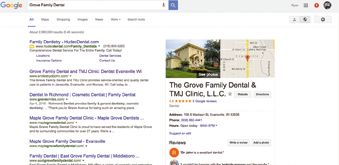6 simple steps to great SEO
Search engine optimization is more important than ever. Here are 6 ways to make sure your site stands out.

In our column last month, we wrote: "Over the next few issues we will provide specific takeaways in reference to: 1) optimizing videos 2) creating proper title tags and meta descriptions, 3) Facebook tips; 4) Improving your SEO performance thus raising your Google rankings; and 5) Provide tips on getting better performance in your pay per clicks."
In keeping with that plan, this month we are going to focus on numbers two and four.
In order to raise your Google rankings through Search Engine Optimization (SEO) performance, you need to have a clear understanding of what SEO is. To do this, we're going to divide SEO into its two parts: Search Engine and Optimization.
So what IS a search engine, anyway?
A search engine is a very sophisticated software program where companies spend millions and millions of dollars to do only two things-and to do those two things significantly well.
First, when the consumer types those few words in the little white box, the search engines go out to the web and find the most relevant information they can.
Second, as they return the information back to the consumer, the software engine ranks the information.
Optimization is what you can do as a website owner to enhance your site, so when the search engines scan the web, they will stop at your website, consider it relevant and rank you highly.
How to get the most out of your web presence
There are six primary ways to improve website ranking and relevancy:
• Maximize your title tags
• Create a customized meta description
• Create a site map
• Create rich and fresh content
• Create website backlinks
• Be socially active
Continue to the next page to learn more about each of these topics

1. Maximize your title tags
A title tag:
• Helps the search engines understand what the page is about
• Is listed at the top of your Internet browser (Fig. 1)
• Consists of 140 characters
The key words placed here alert the search engines to what’s important on your home page. What is critically important is YOU have the ability to decide what words go here. If you don't, Google will decide on its own. Do you really want a search engine to decide what words are important to you as a practitioner for how the consumer will find you? In a word: no.
Fig. 1

The last and most important point: There is a title tag on every page of your website, so make sure to go through your entire site and choose the keywords that best reflect each page.
Notice from this example what is important to Dr. Gernetzke (Fig. 1). The keyword Dental, for example, is more popular in search than "dentist" and "dentistry" combined. That makes it a smart, strategic keyword to add. Notice other keywords important to him: Family, TMJ and his location. For others it could be Invisalign, Implants, Children or Cosmetic - all depending on your area of focus.


2. Create a customized meta description
A meta description:
• Provides the search engines a description of your website
• Is another key area search engines review in assessing relevancy and ranking
• Should be considered as your "elevator pitch"
• Offers a prospective patient more information about your practice
Fig. 2

The meta description is the listing that appears when you place keywords in the white box in Google (Fig. 2). In a split second, a prospective patient will review your description and make a decision to click or not.
You have control of what is stated in your meta description to reflect both what is important to you and to attract the type of consumer you are looking for by using strategic keywords. For this meta description, important key words are: Dental, TMJ, quality, and the office locations. Again, if you don’t create your own meta description, Google will create it for you.


3. Create a site map
A site map:
• Helps search engines find and index all the pages and content on your website
• Can be considered a "Table of Contents for search engines"
• Is created by your website company.
It is very important to have a site map; if you don’t, there is a chance search engines might not find all your content and you might not get proper credit, which affects your relevance and ranking.


4. Create fresh and rich content
Of all the areas discussed and debated by the experts in SEO, when it comes to how Google ranks, in one area they are unanimous: The most critical thing that impacts relevance and ranking is great content. The more you focus on creating original, fresh content, the more chances you have of remaining consistently important to the search engines.
Important content considerations to improve your ranking:
• Use important key words throughout the site-for example: dental, dentist, Invisalign, implants
• Your content should read and flow normally-don’t make it sound like an ad or a series of keywords out of context
• One topic per page ranks better
• Unique content is rewarded; duplicate content is useless
• Fresh, ongoing updates-including text, documents, videos and photos-are important
• If you have a blog, make sure to post often


5. Encourage website backlinks
Any link coming from another website that links back to your website benefits you. So, for example, if you write an article for a dental journal and it is placed online, contact them and ask if they can link back to you.
When it comes to backlinks:
• The more links the better
• Dental links will have more impact
• Search engines will start to look at you as a "Reference Site" and increase your ranking


6. Be socially active
Though they compete with some of these social media icons, Google recognized that they should be included in assessing overall relevance and ranking.
To Google, a "Social Indicator Website"-which brings you benefits-means:
• You are active and engage with Google+, Facebook, YouTube and LinkedIn as your primary focus. If you want to go farther, add Twitter, Instagram and Pinterest to your list.
• You have regular blog posts
For Google to be able to provide you benefit in relevance and ranking when it comes to being socially active, all of your social media properties must be linked to your website-or you will get no benefit at all.
In closing, most of us think that Google provides almost 100 percent of all searches. But that’s not the case! Google is actually responsible for about 65 percent of searches. Bing comprises another 20 percent, and Yahoo! comes in with 13 percent of searches. That means a third of all searches are NOT done on Google! So make sure your website company works to maximize your presence on those search engines too. Until next time!
